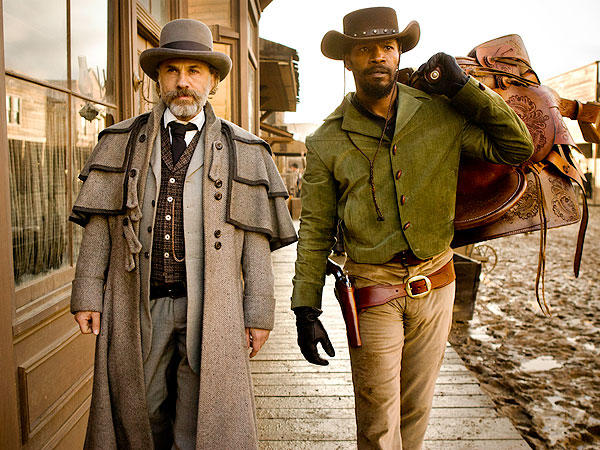
Christoph Waltz and Jamie Foxx
The Weinstein Company
The first hour of Django is brilliant, thanks in part to the divine talent of Christoph Waltz as enlightened German bounty hunter Dr. King Schultz. (Dr. King! Ha!) On a bitterly cold night, Schultz catches up with a pair of slave traders in the woods. The fast-talking German is looking to acquire Django (Jamie Foxx), who may be able to help him find the men he's pursuing. This is a Tarantino movie. I'll let you guess how that meeting goes.
As it happens, Django and King find that they work well together and decide to partner up, with King vowing to help Django get back his wife, Broomhilda (Kerry Washington), who has been sold to a notorious plantation owner, Calvin Candie (Leonardo DiCaprio).
Which bring us to Django's shortcomings. The gabby King, fey Calvin, and cunning Stephen (Samuel L. Jackson), Calvin's head house slave, turn out to be far more interesting than Django himself. That's not Foxx's fault – he certainly tries to make the most of Django's process of self-discovery. It's just that the other guys are so much more showy, with exaggerated mannerisms and over-the-top speechifying. It also doesn't help that the film loses momentum in the middle, dragging out to a climax that owes as much to Scarface as it does to the spaghetti westerns Tarantino obviously adores.
And then there's the n-word. At the risk of sounding like an obsessive, I counted 114 times that particular epithet tumbles out of someone's mouth. Now, there's no way to make a movie about slavery that doesn't acknowledge the regular use of that particularly ugly bit of verbiage. But 114 times (plus one nasty sign)? That’s egregious. Which is why, ultimately, as funny and smart as Django is, it isn't quite as satisfying as Inglourious Basterds.
That film offered an exceptional opening set piece, with Waltz playing the vicious Nazi, Colonel Landa, shooting down a family of Jews beneath the floorboards of a house. That’s all Tarantino needed to make an immediate emotional impact and justify bloody revenge. Django, on the other hand, repeatedly shows degrading brutality toward African-Americans, with the n-word wall-to-wall carpeting the film. A handful of slave traders may get their due, but the audience gets verbally and visually assaulted in the nearly three-hour process.
Still, Django, with its theme of how people play roles to navigate tricky situations, and its frank assessment of the commodification of human beings, leaves a viewer with plenty of conversation afterward, so take a friend. I might not recommend taking your mother, though. I had to hold mine in her seat.
No comments:
Post a Comment